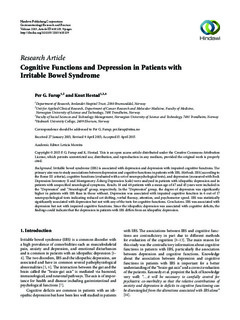Cognitive Functions and Depression in Patients with Irritable Bowel Syndrome
Abstract
Background. Irritable bowel syndrome (IBS) is associated with depression and depression with impaired cognitive functions. The primary aim was to study associations between depression and cognitive functions in patients with IBS. Methods. IBS (according to the Rome III criteria), cognitive functions (evaluated with a set of neuropsychological tests), and depression (measured with Beck Depression Inventory II and Montgomery-Åsberg Depression Scale) were analysed in patients with idiopathic depression and in patients with unspecified neurological symptoms. Results. 18 and 48 patients with a mean age of 47 and 45 years were included in the “Depression” and “Neurological” group, respectively. In the “Depression” group, the degree of depression was significantly higher in patients with IBS than in those without. Depression was associated with impaired cognitive function in 6 out of 17 neuropsychological tests indicating reduced set shifting, verbal fluency, attention, and psychomotor speed. IBS was statistically significantly associated with depression but not with any of the tests for cognitive functions. Conclusions. IBS was associated with depression but not with impaired cognitive functions. Since the idiopathic depression was associated with cognitive deficits, the findings could indicate that the depression in patients with IBS differs from an idiopathic depression.

